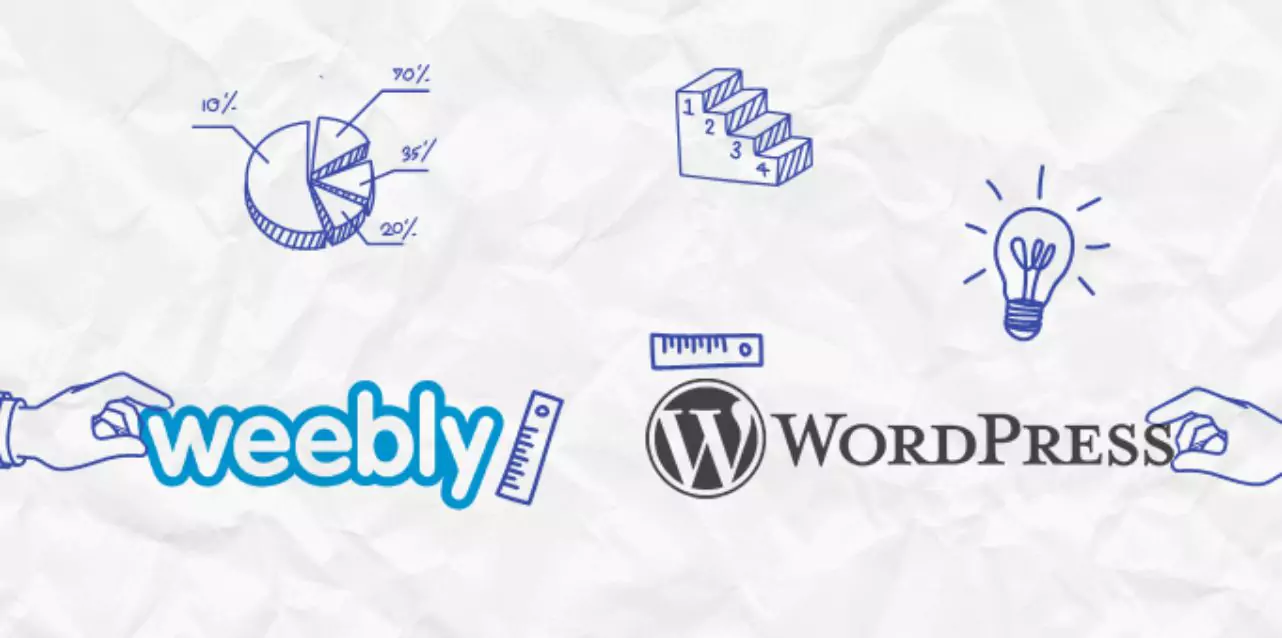Are you ready to build your website but overwhelmed by the many available options? Don’t worry, you’re not alone! Two popular choices for beginners are Weebly and WordPress.
In this blog, we’ll break down the differences between Weebly vs WordPress in simple terms to help you decide which one is best for you.
Creating a website can be like building a house – you need the right tools and materials to make it sturdy and functional. WordPress vs Weebly are like two different sets of tools, each with its strengths and weaknesses. Understanding these differences will empower you to make an informed decision that aligns with your goals and needs.
Whether you’re a small business owner, a blogger, an artist, or just someone who wants to share their passions with the world, choosing the right platform is crucial. So, let’s dive in and explore the features, ease of use, customization options, and more to help you determine whether Weebly or WordPress is the perfect fit for bringing your website dreams to life.
Listen To The Podcast Now:
About Weebly And WordPress
Before delving into the difference between Weebly vs WordPress, let’s first explore the fundamentals of both platforms.
Weebly: Simplified Website Building
Weebly is a user-friendly website builder and software-as-a-service (SaaS) platform- that provides pre-designed tools for building websites. It’s often considered one of the top alternatives to WordPress. With its integrated eCommerce functionality,
Weebly is particularly popular among businesses aiming to enhance their online presence. Upon selecting a subscription tier, users gain access to hosting, customer support, marketing features, and an intuitive drag-and-drop editor.
This editor allows for effortless placement of elements, facilitating the creation of stylish pages in no time. Additionally, Weebly’s App Center offers a variety of freemium applications to enhance website functionality.
Weebly offers four website plans: Free, Personal, Professional, and Performance. However, the free version has limited features and customization options. To unlock advanced tools and benefits such as a free domain name and password protection, users must opt for higher-tier plans starting at $12/month.
WordPress: Versatile Content Management
WordPress is an open-source platform renowned for its versatility and suitability for creating websites of any kind, from personal portfolios to large online stores. Currently powering over 40% of all websites, WordPress stands as one of the premier content management systems (CMS) available.
While WordPress may have a steeper learning curve compared to some website builders, its extensive customization options allow users to create unique and standout websites.
Beginners can leverage plugins to add new functionalities, such as payment forms for online stores or customizable edit screens. For those with technical proficiency, WordPress allows for direct modification of the site’s code, enabling deeper customization.
As a self-hosted platform, WordPress requires users to purchase web hosting and a domain name. The overall cost of a WordPress development website may vary depending on the premium plugins and themes utilized. Hosting providers like Hostinger offer specialized WordPress hosting plans starting at $2.99/month. The popular WordPress Business plan- starting at $3.99/month, includes a free domain name and advanced features like malware scanning and LiteSpeed Cache for improved website performance.
Differences Between Weebly Vs WordPress
In this section, we’ll delve into 11 key distinctions that are crucial- for our Weebly vs WordPress comparison.
1. Ease Of Use:
Weebly:
Weebly stands out as one of the most beginner-friendly website builders. Its contemporary themes and intuitive drag-and-drop interface make it exceptionally easy for users to create and launch a visually appealing website in a short time. Modifying fonts, colors, and layout is straightforward, and adding standard pages, blog posts, and product pages is a breeze.
Users can also create custom drop-down menus with ease. Weebly’s selection of responsive templates caters to various industries and styles, allowing users to find one that suits their brand or personal preferences effortlessly.
WordPress:
In contrast, setting up a WordPress site entails a steeper learning curve compared to Weebly vs WordPress. Users must choose a hosting provider, pick a theme, and decide between utilizing- a page builder plugin or the built-in editor.
While WordPress provides a vast array of themes and plugins, the multitude of- options can overwhelm beginners. Selecting a theme and deciding on editing tools adds complexity. These decisions demand time, research, and often trial and error to find the best fit for users’ needs within the Weebly vs WordPress
Debate.
2. Customization:
Weebly:
Weebly provides customization options, but users may encounter restrictions on altering specific elements or functionalities- confined to what the platform permits. Its marketplace offers additional integrations and apps, yet the selection may lack the breadth and diversity found in the WordPress ecosystem. Despite offering essential functionality, users with unique or specific requirements might find themselves- constrained by Weebly’s limitations.
WordPress:
WordPress grants users complete control over site customization and tool functionality. Its extensive ecosystem of plugins, numbering in the thousands, caters to a wide range of needs, from social integration to e-commerce and SEO enhancements. With these plugins, users can tailor their websites to meet specific demands, significantly expanding WordPress’s core capabilities.
WordPress is famous for letting you make your website just the way you want. It has lots of extra tools you can add called plugins. One such best service provider is Passion8Press, which helps you customize your site even more.
With Passion8Press, users can effortlessly enhance their websites with features such as social media integration and advanced SEO tools. This rich ecosystem empowers users to create dynamic and unique websites that reflect their individuality and goals.
Passion8Press excels in WordPress development, curating captivating websites, and ensuring seamless integration of e-commerce solutions and customized plugins. Their focus on speed, security, and mobile responsiveness guarantees an engaging user experience.
With round-the-clock support and managed blogging services, they offer comprehensive solutions to enhance your online presence. You can also hire WordPress developer for personalized expertise and innovative solutions.
3. Site Management:
Weebly:
Weebly simplifies site management by handling most upkeep tasks automatically. Users don’t need to worry about routine updates or security checks, as Weebly takes care of these tasks on behalf of its users.
WordPress:
WordPress offers comprehensive site management capabilities, allowing users to customize various aspects of their- site settings. From changing permalinks to enabling or disabling comments WordPress provides extensive control over site management.
4. Performance:
Weebly:
Weebly optimizes website speed automatically, but users can further enhance performance by selecting optimized themes and avoiding excessive use of plugins and apps.
WordPress:
When comparing Weebly vs WordPress, note that WordPress performance hinges on hosting, themes, and plugins. Optimize by selecting reliable options and implementing caching and CDNs.
5. Security:
Weebly:
Weebly provides built-in security measures, including free SSL certificates and frequent virus scans. However, users have limited control over security settings as Weebly manages website security on their behalf.
WordPress:
WordPress core software is secure, but users need to stay vigilant by keeping themes and plugins updated. It offers automatic updates for maintenance and security, but users must ensure that third-party themes and plugins are also up to date.
6. SEO:
Weebly:
Weebly offers basic built-in SEO tools, including customizable permalinks, alt text for images, and HTML-friendly layouts. Users can enhance SEO capabilities by installing apps from the Weebly App Center, although the selection may be limited.
WordPress:
When comparing Weebly vs WordPress, WordPress provides extensive SEO capabilities, with plugins like Yoast SEO offering features such as, canonical URLs, meta tags, and on-page SEO analysis. WordPress’s robust SEO services make it a preferred choice for users looking to optimize their websites for search engines.
7. E-commerce:
Weebly:
Weebly offers built-in e-commerce capabilities, including inventory control, shopping carts, and automatic tax calculators. Additional e-commerce features are available through paid plans, but users may find limitations compared to WordPress.
WordPress:
WordPress offers e-commerce functionality through plugins like WooCommerce, providing a wide range of features for building and managing online stores. WooCommerce is highly customizable and scalable, making it a popular choice for e-commerce websites.
8. Blogging:
Weebly:
Compared to Weebly vs WordPress for blogging, Weebly provides simple tools for customizing posts, organizing content with categories and tags, and managing comments effectively.
WordPress:
WordPress was originally designed for blogging and offers advanced blogging capabilities, including customizable user roles, password protection for posts, and extensive comment management options. WordPress’s robust blogging features make it a preferred choice for bloggers.
9. Support & Community:
Weebly:
Weebly provides customer support through its knowledge base, tutorials, and automated chat feature. However, support options may be limited compared to WordPress.
WordPress:
WordPress relies on community support forums and third-party hosting providers for customer support. While WordPress offers extensive community assistance, users may need to rely on hosting providers for direct support.
10. Price:
Weebly:
Weebly offers pricing plans ranging from free to $29 per month, with additional features available in paid plans. Additional costs may arise from purchasing apps and integrations from the Weebly App Center.
WordPress:
WordPress software is free, but users need to pay for hosting and may incur additional costs for premium themes and plugins. Pricing for hosting plans varies depending on the provider and the features included.
11. Plugins And Apps:
Weebly:
Weebly offers a selection of apps from its App Center, providing additional functionality for Weebly websites. While the selection may be limited compared to WordPress, users can find apps to enhance their site’s capabilities.
WordPress:
WordPress boasts a vast ecosystem of plugins, offering a wide range of- functionalities for WordPress websites. With thousands of plugins available, users can find plugins to meet their specific needs and customize their sites extensively.
Overall, both Weebly vs WordPress offer unique strengths and capabilities, catering to different user preferences and requirements. Understanding these differences can help users make an informed decision- when choosing between Weebly and WordPress for their website needs.
Also Read:
Top 7 WordPress Development Best Practices To Make Your Website Shine
WordPress SEO Services: Boost Your Rankings With Experts
Wrapping Up
Weebly vs WordPress are both popular choices for creating appealing, mobile-friendly websites, but they differ significantly in usability and capabilities. Weebly is beginner-friendly and ideal for those seeking simplicity.
In contrast, WordPress offers extensive customization and scalability, attracting users willing to invest time in learning. With outsourcing WordPress developers like Passion8Press, WordPress becomes even more accessible for those seeking advanced features and tailored development solutions.
Ultimately, the platform you choose- depends on your priorities and willingness to invest time in learning.









